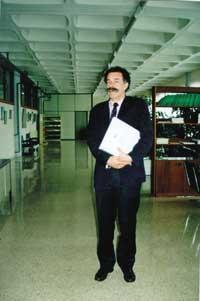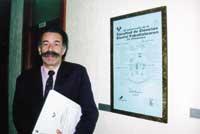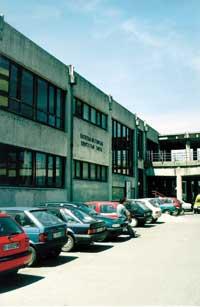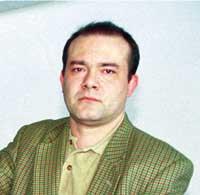Faculty of Sciences for the next 25 years
1998/09/01 Kortabarria Olabarria, Beñardo - Elhuyar Zientzia Iturria: Elhuyar aldizkaria
Manuel Tello is for the second time at the Dean of the Leioa Faculty of Sciences. See the faculty perfectly. “The faculty is fine. In these 25 years, actually, 30 have experienced spectacular qualitative growth. That is why I am here, that has encouraged me to be here, the objectives of making an approach for the next 25 years. It’s been my turn to walk within the first 25 years, now we’ve set the priorities ahead and we’re preparing the next 25 years.”
The Faculty of Sciences already has a large part of the journey in the next 25 years, the initial, which must make decisions that mark the direction. The first ones that have been adopted correspond to the building. “The faculty was designed for 1,500 students and 150 teachers. Today we have 5,500 students in first and second cycle, 300 in third cycle and 360 teachers. Among the priorities we had to analyze the question of the place. In addition, over time the Faculty has deteriorated.”
New building

That is why the construction project arises in the Faculty of Sciences. “Work will begin in September. When will it end? It is difficult to say, because it must be carried forward with the daily work of the faculty. The work, schools and research work must be simultaneous, and that is not easy. It is expected that teaching hours are not lost and that only a little is lost in research work.”
According to the project in their hands, in the future building of the Faculty of Sciences a distinction will be made, on the one hand the research departments and the third cycle will be installed; on the other, the classrooms of the first two cycles. The building has 40,000 square meters and will have 55,000 square meters. “Given the number of people we have, we can’t say it’s too much room, but with the money we have we can’t do more than that. The work is expensive, since the premises that will adapt to the research work are of great demand, about 4,000 million pesetas more what will be needed in infrastructures.
I think that after doing the work we will have a nice building that will not have to touch in another 25 years. If you need an interior change, we can make it as cheap as possible thanks to the system that we have installed, since the conditioning of any premises will not require any work. Research sites are mobilizable, reducible or scalable.”
In September 2002 the works of the Faculty of Sciences of Leioa will be completed. Due to its importance, it is not the only one that will be modified in the next 25 years, since changes in teaching are also announced.
New programming
The following modifications are a consequence of the answer to a specific question: What role should the Faculty play in the economic development of the Basque Country? “In principle there is a key issue, the creation of personal resources, the training of people who respond to the needs of Euskal Herria. Science and technology are getting closer every day. The productive environment, to be competitive, needs to be close to science. Therefore, science, if it is to be really useful, must be applicable.”
Hence the modification of the curriculum of the Faculty of Sciences. The new plan states that the five classical degrees, mathematics, physics, chemistry, geology and biology, will be added new, which will be closer to what society demands today. “Not only that, but also in degrees that respond to needs that society still does not feel or demand, but can have in the future. We have prepared a new offer based on current teaching staff and their capacity. The quality of the offer is assured in this sense, since the teachers are dressed and experienced.
The approach is more dynamic, since there is a basic training for all in their specialties and then diversifies from the 3rd course.

The new system has many advantages. To begin with, students will not have to choose from the first course as now and can modify it. It then allows the rapid recycling of professionals in the productive field, since based on specialization, anyone can recycle in a short time. A third consequence of this system is that it allows us to optimize our resources and reduce the supply. On the other hand, it can happen to us that some degree does not have requirements and it would not be difficult to modify them, since we would only have to change two courses. Finally, we could guide teachers’ research to find new degrees.”
Language projects
In view of the next 25 years of the Faculty of Sciences of Leioa, together with the new building and the new curriculum, the steps to be taken in the languages of studies are of vital importance.
In another section of this work on the Faculty of Sciences it is more widely spoken about the intentions that exist in this institution with respect to the Basque language. The dean himself sums it up in one sentence. “We would like to achieve normalization based on the existing demand, to meet the existing demand in the next three years.”
Along with the offer in Basque and Spanish, the Faculty of Sciences also wants to make English. “We want to reach agreements with external universities so that all students can spend at least one year at another university. We want to reach an agreement with the universities of the State so that the displacement of the students is real without process of validation or modification of file. For this we shall gather all the deans of the powers of the State.
We also want to do something with foreign universities. Our faculty, in terms of the quality of teaching, is located in a good place in Europe, that is, they know that students who leave our faculty come dressed at European level. We want to advance this path and make an offer in English, if we have enough teachers for it, and students also agree, as 70% of the people consulted agreed.”
If the idea were to be carried out, Manuel Tello considers it a unique opportunity to modernize the University of the Basque Country and the Basque Country, which in programs such as Erasmus would not generate problems and also allow closer relations with most European faculties.
Data from the Faculty of Sciences of Leioa
- More than 450 international publications per year.
- 165 research projects in 1997, with a total budget of 1,168 million.
- Between 92 and 93 doctoral theses, 223 throughout the university.
- 35 doctoral theses in the period 93-94, 177 throughout the university.
- 42% of publications throughout the University.
- 39% of research projects across the university.
- 33% of university-business contracts across the university.
- 360 teachers (56 in Basque).
- 250 researchers.
- 5,500 students currently divided into 79 groups (17 in Basque).
- 46 classrooms.
- A total of 8,500 graduates, 520 in the last year.

Gai honi buruzko eduki gehiago
Elhuyarrek garatutako teknologia





